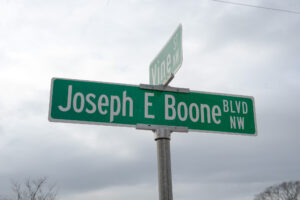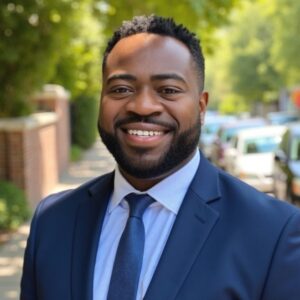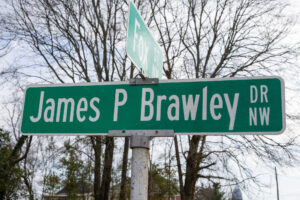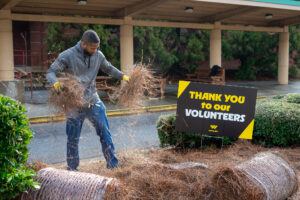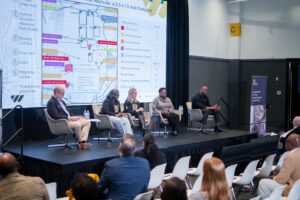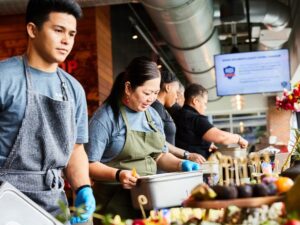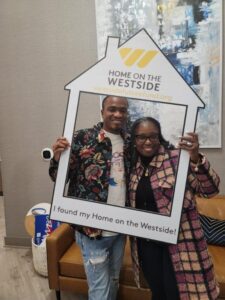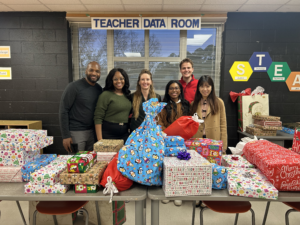Atlanta’s historic Westside is a living testament to the city’s rich past and enduring legacy. Throughout the community, streets and landmarks tell the stories of trailblazing leaders whose contributions shaped Atlanta—and the nation.
In honor of Black History Month, we are launching a blog series exploring the namesakes of four significant streets that run through the historic Westside. Running through the heart of Atlanta’s Westside, Joseph E. Boone Boulevard stands as a testament to the legacy of a beloved civil rights leader and community advocate. Formerly known as Simpson Road, the street was renamed in 2008 to honor Reverend Joseph Everhart Boone, a man known as “the picketing preacher” for his fearless activism during the Civil Rights Movement.
Joseph E. Boone: A Life of Leadership and Activism
Born in 1922, Joseph E. Boone was shaped by education, faith, and athletics. A graduate of Booker T. Washington High School, he was a star athlete who played Negro League football with the New York Brown Bombers before captaining Houston Tillotson College’s football team. However, his true calling was ministry. After earning his Bachelor of Divinity from Gammon Theological Seminary, he began a career as a pastor and activist—one that would define his legacy.
Before coming to Atlanta, Boone led Alabama’s first Selective Buying Campaign, a precursor to the economic boycotts that helped dismantle segregation across the South. As pastor of Rush Memorial Congregational Church, he mobilized students for the Atlanta Student Movement, which helped desegregate lunch counters, theaters, and public spaces. His leadership nurtured future civil rights icons like Julian Bond, Lonnie King, Marian Wright Edelman, and Carolyn Long Banks.
Beyond Atlanta, Boone was a chief strategist for economic justice, working alongside Dr. Martin Luther King Jr. as the chief negotiator of Operation Breadbasket, a campaign that pressured businesses to hire Black workers and support Black-owned enterprises. He later served on the Georgia Governor’s Council on Human Relations, appointed by Governor Jimmy Carter.
His activism extended into media and business, co-chairing Atlanta Against Unfairness in Broadcasting, which successfully pressured the FCC to enforce fair programming. He also led initiatives supporting job training, drug treatment, and housing for underserved communities.
Recognized with the Civil Rights Legend Award in 2003 and honored by Congress in 2006, Boone’s relentless fight for justice left a lasting mark on Atlanta. Former Mayor Andrew Young described him as “an aggressive prophet of nonviolent protest.” Today, Joseph E. Boone Boulevard stands as a tribute to his enduring impact, a road that carries forward his vision for justice and equality.
The Boulevard: A Road of Resistance and Renewal
Renaming Simpson Road to Joseph E. Boone Boulevard was a fitting tribute to a man who dedicated his life to fighting injustice in Atlanta. The boulevard runs through neighborhoods that were at the heart of Boone’s work, including Vine City and English Avenue, where he championed economic empowerment, community organizing, and public service.
One notable landmark along Joseph E. Boone Boulevard is Fire Station 16, where Atlanta’s first Black firefighters were stationed after the city integrated its fire department in 1962. A historic plaque outside the station commemorates the efforts of civil rights leaders—including Boone—who pressed Mayor Ivan Allen to integrate the department. Recently, Fire Station 16 received $500,000 in federal funding for restoration, ensuring that this piece of civil rights history remains preserved for future generations.
Westside Future Fund Efforts Along Boone Blvd
True to Joseph E. Boone’s legacy, Westside Future Fund (WFF) is driving transformative development along the blocks surrounding Joseph E. Boone Boulevard, reinforcing its mission to build a vibrant, mixed-income community on Atlanta’s historic Westside.
Just one block away, previously blighted land has been revitalized into single-family homes, now providing stable housing for families with live, learn, and work connections to the community—including staff from the Atlanta University Center and local nonprofits dedicated to serving the Westside.
Expanding on these efforts, Proctor Street Village, a forthcoming development, will introduce a mix of single-family and multifamily homes, delivering dozens of high-quality, affordable housing units and further strengthening local housing opportunities.
One of WFF’s most anticipated projects, 839 Joseph E. Boone Blvd, is set for completion in 2025. This mixed-use development will feature 33 affordable rental units alongside 1,200 square feet of commercial space, bringing much-needed housing and retail opportunities to the corridor.
Adjacent to this new development is Kathryn Johnston Park, a vital greenspace that WFF helped bring to the community in partnership with local leaders. The park serves as both a recreational space—with a full-scale playground for children—and a stormwater management solution, helping to alleviate long-standing flooding issues. To ensure the park remains a welcoming space for residents, the WFF Volunteer Corps regularly hosts community clean-ups and maintenance efforts.
As WFF moves into Our Next Chapter—a pivotal capital campaign funding its affordable housing goals through 2028—its work along Joseph E. Boone Blvd stands as a testament to its commitment to inclusive, sustainable progress for the historic Westside.
Learn more about Our Next Chapter today.

